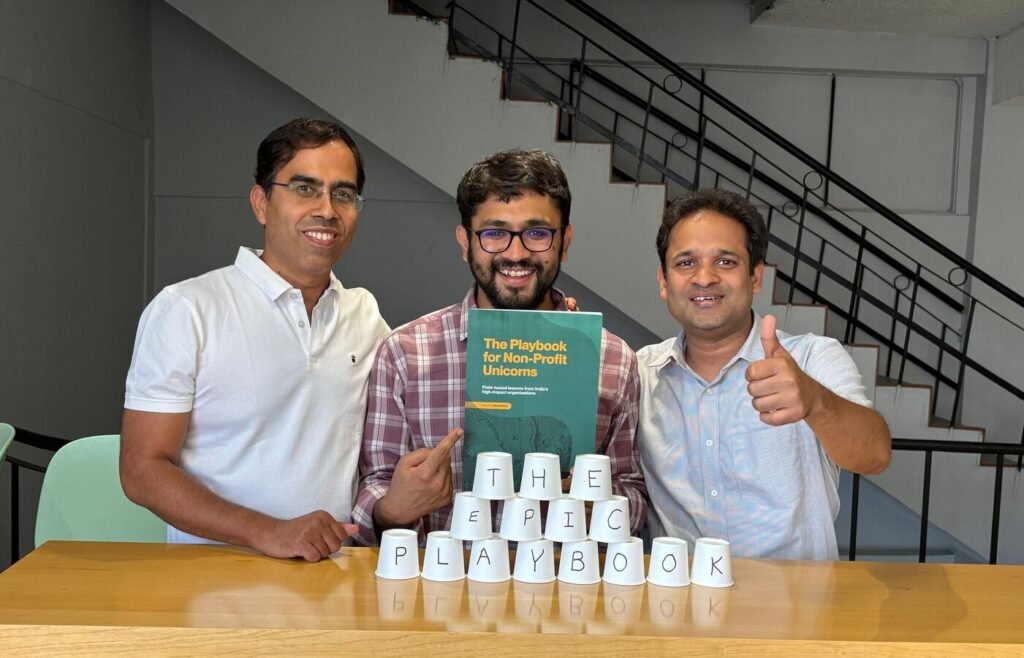A team of entrepreneurs has come together with a unique idea to scale up non-profits with a start-up mindset.
The trio recently released what they call “The Playbook for Non-profit Unicorns”. The playbook, essentially a report, offers field-tested lessons from non-profits and argues that India’s development sector is ready for its own tech-like inflection point.
Non-profit unicorns are organisations that impact a million people or 5 per cent of the target user base meaningfully, Varun Aggarwal, co-founder of ‘Change Engine’ and ‘The Playbook for Non-Profit Unicorns’.
Aggarwal is a Massachusetts Institute of Technology (MIT) alumnus who co-founded the job skills testing firm Aspiring Minds, which was sold in 2019. The other two co-founders are Shubham Bansal, an IIT Delhi and EPFL Switzerland alumnus; and Shailendra Nath Jha, an entrepreneur and Indian School of Business (ISB) alumnus.
Aggarwal spoke with LiveMint about the playbook idea and why it matters. While playbooks for tech startups abound, he says, there aren’t any for mission-driven non-profits tackling complex social problems.
Change Engine, through this ‘playbook,’ is changing that by helping high-potential non-profits unlock scale with the same clarity and ambition as venture-backed startups, he says.
“The idea for the ‘Playbook for Non-profit Unicorns’ emerged from observing specific pain points that non-profit founders were facing. One of the challenges we observed is that the non-profit founders were running incredible programs, impacting between 100 to 500 people, but they did not have a framework in place to reach tens of thousands to a million people. We realised that they lacked understanding about what it takes to scale the impact of a non-profit, benchmarks and what it may take to build a non-profit unicorn,” Aggarwal says.
Accelerator for non-profits
Change Engine is a first-of-its-kind accelerator for non-profits. It supports exceptional founders to build non-profit unicorns—organisations that can meaningfully impact a million lives, Aggarwal says.
The larger aim is to identify high-potential founders through an accelerator program and work closely with them to find scaling levers, test them, and set them up to become a non-profit unicorn.
But why focus on scaling up non-profits? Non-profits operate where there is a market failure, says Aggarwal.
“India boasts 100+ unicorns—startups valued more than USD 1B—who have unlocked tremendous economic opportunities. These companies have reshaped industries and put India on the global innovation map; we continue to struggle with pressing challenges. 12 per cent of India’s population, roughly 170 million people, still live in extreme poverty,” Aggarwal said.
Although the public and business leaders often misunderstand nonprofits, Aggarwal says they are critical enablers of systemic change and economic progress. He says nonprofit work has enabled many significant national transformations, such as UPI, reductions in infant mortality rates, and ease of doing business.
Non-profits are critical enablers of systemic change and economic progress.
“We have 45-50% of children failing to achieve basic learning outcomes, unemployment hovering at 7-8 per cent with only 51 per cent of graduates being employable, and women’s workforce participation stagnating at 32 per cent. These aren’t niche problems requiring boutique solutions. Instead, they are systemic failures demanding systemic interventions. This is where non- profits step in. And that is why they need to scale up,” he says.
Mindset Shift
The mindset shift, therefore, becomes fundamental, he says. The startups naturally look at scale, but non-profits do not do so naturally. So, through the term ‘Non-profit Unicorns,’ we are bringing in a new thought process. The aim is to spark imagination among the founders and adopt a scale-first thinking to address systemic causes,” Aggarwal says.

